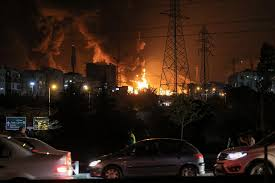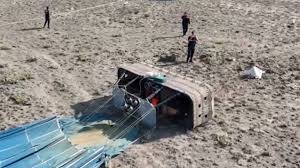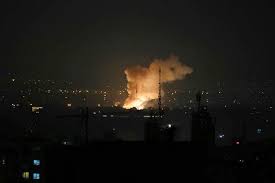Fragile Truce Holds Between Iran and Israel After Unprecedented Direct Military Confrontation

Fragile Truce Holds Between Iran and Israel After Unprecedented Direct Military Confrontation
Introduction
The Middle East stands on edge as a tenuous truce takes hold between Iran and Israel following days of direct military engagement — a first in the two nations’ decades-long shadow conflict. While active hostilities have paused, the risk of renewed escalation remains dangerously high. The confrontation marks a new era in regional geopolitics, raising urgent questions about deterrence, diplomacy, and the limits of containment in a rapidly evolving strategic landscape.
1. Timeline of the Conflict: From Proxy to Direct Strikes
For years, Iran and Israel have waged a covert war through cyber operations, intelligence missions, and proxy forces across Syria, Lebanon, and the broader Middle East. But this latest escalation shattered precedent:
- Day 1: Israeli airstrikes reportedly targeted deep strategic installations in Iran, including IRGC bases and suspected missile facilities.
- Day 2: Iran launched over 120 ballistic and cruise missiles at Israeli territory, triggering widespread alarm and partial evacuations in key Israeli cities.
- Day 3: The U.S. and Gulf states brokered emergency talks, leading to a ceasefire with quiet backchannel mediation through Oman and Qatar.
2. Ceasefire Terms and Immediate Impacts
While neither side has officially acknowledged detailed ceasefire terms, diplomatic sources indicate the following:
- Cessation of offensive operations by both parties.
- Mutual monitoring through third-party observers, including select EU and Gulf representatives.
- No-fly zones over specific flashpoint regions in Syria and the Gulf for a limited duration.
The ceasefire is not built on trust but on exhaustion and international pressure. Both sides remain on high alert.
3. International Response: Diplomacy in Overdrive
The international community has responded with a mix of relief and urgency:
- UN Security Council convened an emergency session calling for restraint and long-term de-escalation frameworks.
- The United States sent top-level envoys to Tel Aviv and Vienna to stabilize regional alliances and prevent miscalculations.
- China and Russia urged a return to nuclear diplomacy and regional dialogue forums.
The broader global concern is clear: unchecked escalation between two military powers — one with nuclear weapons and the other with nuclear ambitions — could ignite a conflict with worldwide consequences.
4. Domestic Fallout: Political and Civil Reactions
In Israel:
- Political unity has temporarily solidified behind the government’s defense actions.
- Public opinion is divided over whether deterrence was achieved or future retaliation is inevitable.
In Iran:
- The IRGC declared victory in resisting aggression but faces internal scrutiny over strategic exposure.
- Economic anxiety is mounting amid fears of renewed sanctions and currency volatility.
5. Regional Consequences: A Dangerous Calm
While missiles have stopped flying, the regional situation remains volatile:
- Hezbollah and Iranian-backed militias are on standby in Lebanon, Iraq, and Syria.
- Gulf nations are strengthening air defense networks and preparing for possible spillover.
- Energy markets are still jittery, with oil prices hovering above $100/barrel due to Strait of Hormuz insecurity.
The risk of proxy reactivation remains high, and a single misstep could unravel the fragile truce.
6. What Comes Next: Truce, Treaty, or Tactical Pause?
The current truce is not a peace agreement — it's a tactical pause. Key questions remain:
- Will diplomatic momentum lead to a broader non-aggression framework?
- Can backchannel diplomacy reinstate a modified nuclear agreement?
- Are new regional security arrangements possible — or already too late?
Analysts caution that unless root causes — Iran’s nuclear program, Israeli security concerns, and proxy dynamics — are addressed, the region may return to the brink with even greater force.
Conclusion: A Temporary Reprieve in a Long War
The fragile truce between Iran and Israel marks a temporary reprieve in a conflict that has now crossed a dangerous threshold. While the guns have fallen silent for now, peace remains elusive. The coming weeks will test the durability of diplomacy, the resolve of regional powers, and the world’s appetite for proactive conflict prevention in one of the most volatile corners of the planet.
League Manager Editorial Team






Leave a Comment